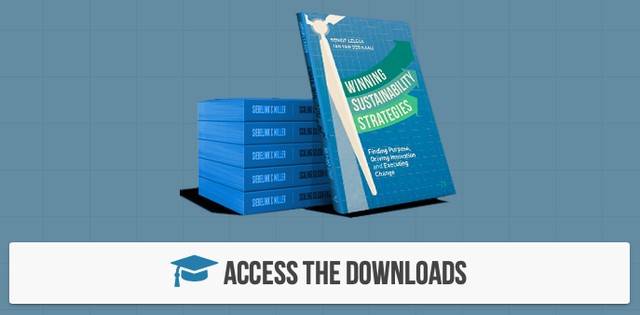Thank you for visiting the Finch & Beak website. Finch & Beak is now part of SLR Consulting, a global organization that supports its clients on setting sustainability strategies and seeing them through to implementation.
This is an exciting time for us, as our team now includes an array of new colleagues who offer advisory and technical skills that are complementary to our own including Climate Resilience & Net Zero, Natural Capital & Biodiversity, Social & Community Impact, and Responsible Sourcing.
We would like to take this opportunity to invite you to check out the SLR website, so you can see the full potential of what we are now able to offer.
Co-authored by Jan van der Kaaij, Managing Partner at Finch & Beak, and Benoit Leleux, Stephan Schmidheiny Professor of Entrepreneurship and Finance at business school IMD, Winning Sustainability Strategies (Palgrave, 2019) is a book that offers practical suggestions for improved effectiveness of sustainability strategies based upon practitioner cases and data analysis from the Dow Jones Sustainability Index.
Contrary to popular belief and the optimism generated by the ambitious global targets set in the Paris Agreement and the UNs Sustainable Development Goals, the implementation of corporate sustainability programs has been slow at best, sloppy and ineffective at worst. Less than a third of global companies have developed clear business cases or supported value propositions for their approaches to sustainability. With many initiatives stuck in storytelling or cherry-picking mode, the need for the executive level to start thinking about transformation towards a more sustainable business model is rising as rapidly as the levels of carbon dioxide in our atmosphere. Winning Sustainability Strategies inspires companies towards a more effective design and implementation of sustainability programs based upon a stronger sense of focus dubbed "Vectoring".
Companies and executives need to develop a new sense of urgency when it comes to sustainability, moving it from the realm of compliance to that of a key driver of performance and innovation, which requires imbedding it deeply into their core strategies. Partnering capabilities are becoming essential to develop circular economy business models that are viable. And crossing the chasm in this case requires education, new skills, competences and tools.
Capitalizing on the experience of a large collection of award-winning sustainability champions, such as DSM, Patagonia, Unilever, Umicore and Novozymes, and years of experience consulting with executive teams and companies effecting similar changes, Winning Sustainability Strategies reveals how to design and implement a stronger sense of focus and obtain more forward thrust in sustainability programs. This proven combination of direction and speed is dubbed “Vectoring”.
It is analogous to the navigation service provided by an air traffic controller, whereby the controller decides on a particular path for the aircraft, composed of specific legs or vectors, which the pilot then follows. Sustainability programs that are looking for their North Star or Polaris, can lack air traffic controllers or often pilots for that matter. The absence of directional bearings, or the selection of inadequate ones, lead to misguided, uncoordinated actions and usually unsatisfactory results from sustainability initiatives.

To develop the concept of Vectoring, practitioner cases from sustainability leaders were examined in depth together with the anonymized results from ten selected industries in the Dow Jones Sustainability Index (DJSI) benchmark between 2015 to 2017 from automotive, banking, chemicals, construction materials, electric utilities, pharmaceuticals, food products, professional services, textiles and telecom.
Based upon practitioner cases as well as big data analysis from the Dow Jones Sustainability Index, Winning Sustainability Strategies offers a practical framework as well as access to a range of DIY resources for identifying the relative performance of sustainability programs, how to identify and locate inhibitors and how to overcome them. The framework, and its associated four fundamental archetypes, delivers valuable insights for sustainability practitioners and C-suite executives.
As such, vectoring becomes a key strategic tool with numerous applications, such as:
The ultimate objective of vectoring is to provide a clear, potent framework that offers directions for executives to help shift their companies from integrated reporting to truly integrated sustainability thinking.
- Daniel Wild, PhD - Former Co-CEO, RobecoSAM |
Finch & Beak
hello@finchandbeak.com
+34 627 788 170